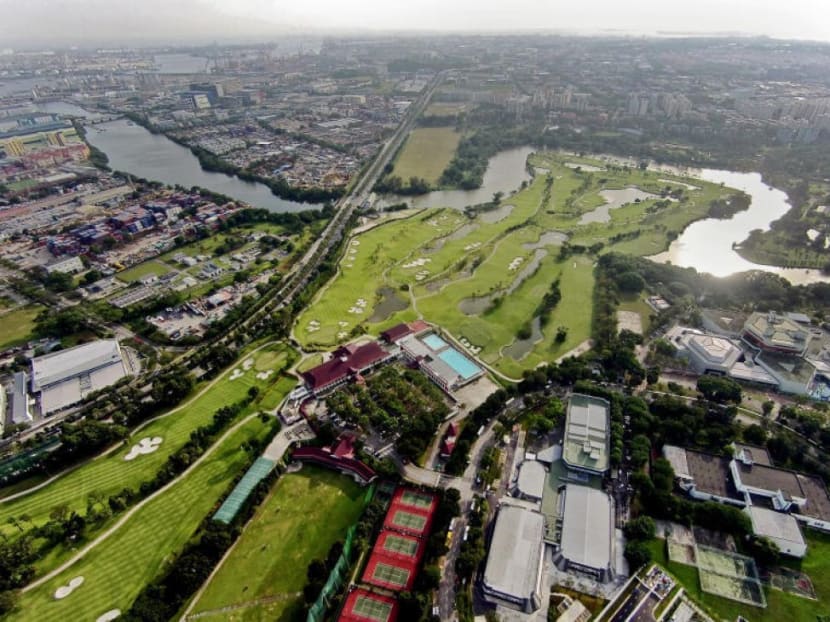Quality living in a connected city, three ministers pledge
SINGAPORE — Through mega aviation and port projects, as well as continued investments in rail and mobility initiatives and new housing developments, the Government will ensure a quality living environment for Singaporeans and keep Singapore one of the most connected cities in Asia.
SINGAPORE — Through mega aviation and port projects, as well as continued investments in rail and mobility initiatives and new housing developments, the Government will ensure a quality living environment for Singaporeans and keep Singapore one of the most connected cities in Asia.
Some 3,000 flats with shorter waiting times of two to three years — instead of the usual four years — will be launched this year and next, and the first batch of flats in the Tengah "Forest Town" will be launched in the second half of this year, said Minister for National Development Lawrence Wong on Tuesday (May 8) in his addendum to President Halimah Yacob's address at the opening of the second session of the 13th Parliament.
"Home ownership remains the key social pillar of our nation," said Mr Wong. "We are tapering the building of new flat to a more sustainable level, but we will continue to maintain a sufficient supply to meet the housing needs of Singaporeans, from young families, to seniors and singles."
For seniors, Mr Wong said a new model of assisted living that combines housing with care services will be piloted to enable them to live independently and with dignity.
On transport, Transport Minister and Coordinating Minister for Infrastructure Khaw Boon Wan said the rail network will expand by 130km in the next 12 years. The construction of the Thomson-East Coast Line is underway, with the Jurong Region Line and Cross Island Line to follow. This plan is "on track" to bring eight in 10 households within a 10-minute walk from a train station by 2030, Mr Khaw said.
The authorities will introduce a licensing framework for bicycle sharing operators and registration for e-scooters by the end of this year, he added. This will enhance enforcement against indiscriminate parking and reckless riding and instil a more responsible culture among users.
On a larger scale, Singapore will continue to foster its connection to the global economy with Changi Airport's expansion, the next generation Tuas Port, as well as the Kuala Lumpur-Singapore High Speed Rail and the Johor Baru-Singapore Rapid Transit System Link.
Such developments continue to be important as aviation and maritime sectors continue to be the "lifelines of Singapore's economy", contributing more than 10 per cent of its Gross Domestic Product and 250,000 jobs, said Mr Khaw.
"We cannot take (Singapore's position at the heart of international trade and investment) for granted. Many in the region are working hard to replace us, with shipping and flight routes bypassing Singapore," he said.
The Government will balance economic growth with environmental protection, pledged Minister for the Environment and Water Resources Masagos Zulkifli.
Singapore will undertake a voluntary national review of the United Nations' sustainable development goals in July this year, he said.
It will implement mandatory reporting of packaging data and packaging waste reduction plans by 2021, while supporting the wider use of on-site food waste digesters at commercial premises and hawker centres.
The upcoming Tuas Water Reclamation Plant and integrated waste management facility — touted as the world's first — will cut carbon emissions by more than 200,000 tonnes a year, said Mr Masagos.
Technology will increasingly feature in the environmental services industry — to manage waste collection remotely, through the use of robotics to sort recyclables at materials recovery facilities, and the use of autonomous cleaning to free up workers to perform "higher value work", he said. "We will work together to build on (our pioneers') precious legacy, and leave our children with a smart, green and livable home," he said.
Key initiatives for each ministry:
Ministry of Transport
- Rail network to grow by another 130km by 2030
- Rail reliability target of 1,000,000 mean km between failures by 2020; to be achieved by accelerating asset renewal and intensifying maintenance of older lines through extended engineering hours
- Licensing framework for bicycle sharing operators and registration of e-scooters to be introduced by the end of 2018
Ministry of National Development
- First batch of HDB flats in the new Tengah 'Forest Town', designed to be surrounded by greenery and nature, to launch in the second half of the year
- 90 per cent of Singaporeans to live within a 10-minute walk of a park by 2030 as network of green corridors will be expanded from 310km to 400km
- New assisted living model that integrates social services with housing to be piloted for seniors
- Adoption of more productive construction methods to double from the current 20 per cent of all new projects to 40 per cent by 2020
Ministry of the Environment and Water Resources
- Undertake a voluntary national review of UN's sustainable development goals in July
- Implement mandatory reporting of packaging data and packaging waste reduction plans by 2021
- Support wider use of on-site food waste digesters at commercial premises and hawker centres
- Build 13 more modern hawker centres by 2027









